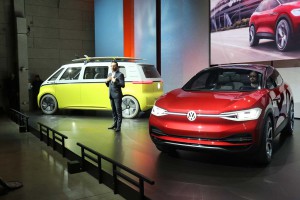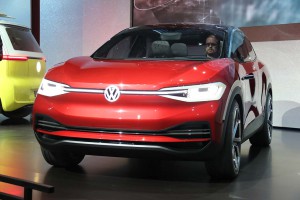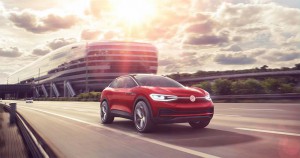As it continues to shift away from diesels to battery-electric vehicles, Volkswagen has confirmed plans to introduce a new all-electric SUV in 2020 that will target the U.S. market.
Based on the I.D. Crozz concept first unveiled at the Shanghai Motor Show last April, the new ute will be one of 30 battery-electric vehicles the German maker plans to introduce worldwide by 2025. VW said last week it is investing over $40 billion to support that push, as well as the development of autonomous and fully driverless vehicles.
The launch of the I.D. Crozz-based SUV and a battery-electric microbus dubbed the I.D. Buzz “will help Volkswagen to kick off an EV revolution in the United States,” said Hinrich Woebcken, CEO of Volkswagen Group of America.
The battery SUV will have “the price and interior space of a mid-size SUV,” hinted Juergen Stackmann, the board member overseeing VW brand sales, at a preview ahead of the 2017 Los Angeles Auto Show. He also suggested that the new model will feature fast-charging an a range of “up to 300 miles.”
(VW investing over $40B on EVs, autonomous vehicles. For the story, Click Here.)

VW plans to have 30 fully electric vehicles ready by 2025, including models based on the ID Buzz and ID Crozz concepts.
VW has made a dramatic shift in focus since it was revealed in September 2015 that it rigged two diesel engines to illegally pass emissions tests. The scandal has, so far, cost the company more than $30 billion, but also has led to “new ways of thinking,” said Stackmann.
All told, VW expects to sell at least 1 million all-electric vehicles by 2025 and grow from there. To achieve that goal it has developed an entirely new architecture, dubbed the MEB, that will be used by the battery-electric vehicles, or BEVs, it is working up. The MEB platform, meanwhile, will be shared between the various Volkswagen Group brands, including mainstream marques like Seat and Skoda, as well as up-market brands like Audi.
By opting for a unique electric platform VW said it won’t have to make the compromises suffered with existing models like the e-Golf. The battery packs used in models like the new SUV and the I.D. Buzz minivan will be located in the load floor, for one thing. That lowers the center of gravity while also providing more space for passengers and cargo. The new ute will actually be closer to the current VW Tiguan in size but will offer midsize interior space since engineers and designers will be able to repurpose space traditionally gobbled up by the engine compartment.
Going forward, VW will focus on driving the rear wheels of its new BEV fleet, but many models, including the 2020 SUV, will be offered with all-wheel-drive, Christian Senger, VW’s head of e-mobility, explained.

VW's ID Crozz concept will help kick off an "EV revolution" in the United States for the German automaker.
The automaker has said its conventional models will all be offered with at least one form of “electrified” drivetrain alternatives, whether hybrid, plug-in or BEV. But the electric SUV coming in 2020 will be part of an all-new sub-brand to be called Volkswagen I.D.
The carmaker acknowledged it will face challenges getting to market with products that can compete with conventional gas and diesel-powered models without profit-cutting incentives.
(For more on the I.D. Crozz concept, Click Here.)
“We need to be fast,” said Stackmann, “and we need to bring the price (of EVs) down to what people expect to pay for a (gas) car.”
During his presentation the VW board member gave a nod to rival Tesla, saying “I give (them) credit for what it has done so far. Without (Tesla) we wouldn’t have been so bold.”
VW will, in fact, borrow some ideas from Tesla, including the ability to update the software on future models over the air, much like what’s done with today’s smartphones. It may also offer owners the ability to add software-based features, such as semi-autonomous driving and next-generation driver assistance technologies, or upgraded infotainment systems.
Price and range are two of the big challenges VW will have to address if it hopes to go mainstream with its I.D. line-up. But there’s also the question of infrastructure. Charging needs to not only become quicker but more readily available. The German maker said it is addressing that problem, as well, by working to set up a network of fast chargers across the country.
(For more on VW’s EV truck plans, Click Here.)
Ironically, that move is a payoff from the diesel scandal. As part of its settlement with the federal and California state governments, VW has promised to invest over $1 billion to foster development of a nationwide charging network.

